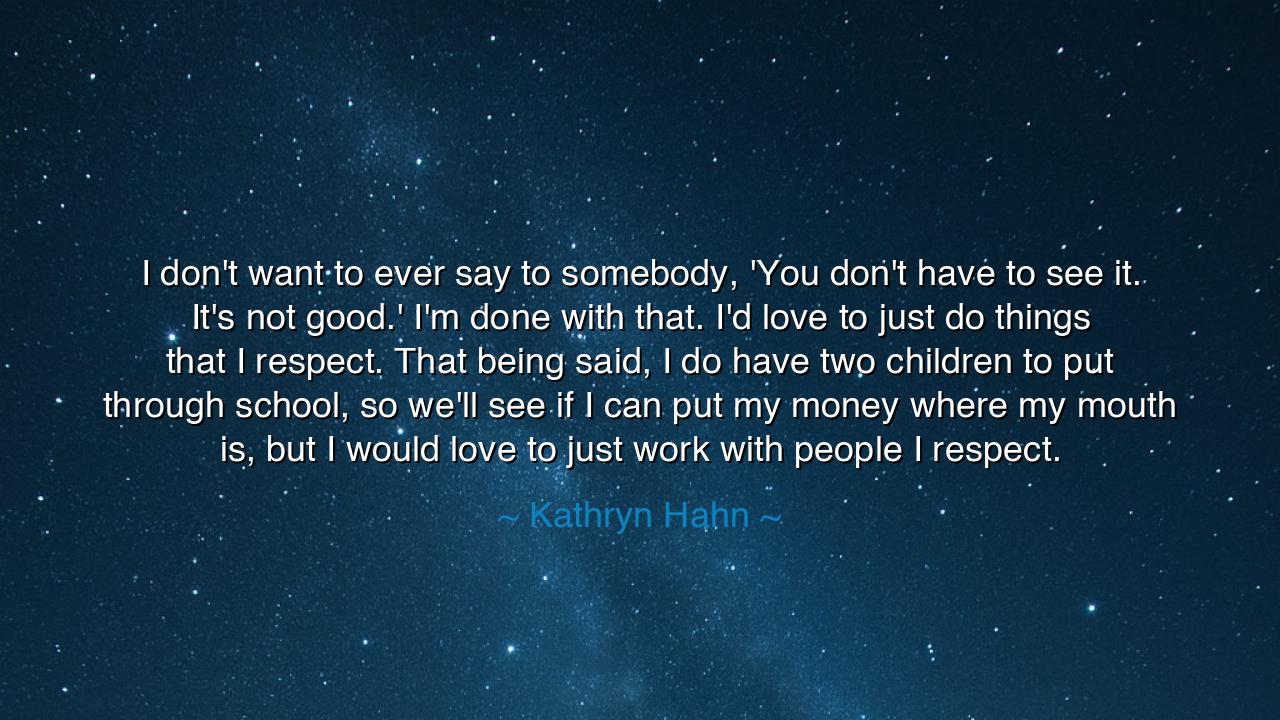
I don't want to ever say to somebody, 'You don't have to see it.
I don't want to ever say to somebody, 'You don't have to see it. It's not good.' I'm done with that. I'd love to just do things that I respect. That being said, I do have two children to put through school, so we'll see if I can put my money where my mouth is, but I would love to just work with people I respect.






Hearken to the words of Kathryn Hahn, whose reflection illuminates the delicate balance between integrity, ambition, and responsibility. She declares, “I don’t want to ever say to somebody, ‘You don’t have to see it. It’s not good.’ I’m done with that. I’d love to just do things that I respect.” In these words lies a timeless principle: true fulfillment arises not from the pursuit of external approval or judgment, but from alignment with one’s own values and respect for the work undertaken. Integrity in creation and collaboration is as ancient as the first artisans and philosophers, who knew that the measure of one’s labor is found in the soul’s accord with it.
Since antiquity, the wise have emphasized the importance of pursuing endeavors that honor personal virtue. The sculptors of Athens, the poets of Alexandria, and the scribes of Babylon did not labor solely for fame or wealth, but for the enduring respect they held for their craft. Hahn’s aspiration to work with people she respects echoes this ancient ethos: the quality of life and work depends upon the integrity of one’s associations and the value placed upon the labor itself.
Consider the life of Leonardo da Vinci, who collaborated with patrons and peers but was guided primarily by his own curiosity, judgment, and respect for the art he created. He chose commissions that resonated with his intellect and vision, refusing others that would compromise his principles. Like Hahn, he understood that collaboration is most fruitful when grounded in mutual respect, and that creative integrity cannot flourish under coercion or disregard for one’s own standards.
Yet Hahn acknowledges the realities of life and responsibility, noting, “That being said, I do have two children to put through school, so we’ll see if I can put my money where my mouth is.” Here is the eternal tension: the pursuit of virtue and respect is often weighed against practical necessity. The ancients, too, recognized this struggle; the Stoics taught that one must balance moral action with the duties of life, reconciling ideals with the responsibilities that sustain oneself and one’s family. Hahn embodies this wisdom, striving to harmonize principle with provision.
Her reflection also speaks to the ethics of judgment. By rejecting the desire to tell others what they must or must not see, Hahn honors the autonomy of others while remaining true to her own standards. Ancient philosophers, from Confucius to Seneca, emphasized that virtue lies in guiding by example rather than imposing edicts. Respect for others, coupled with respect for oneself, produces a life of integrity and authenticity—a lesson Hahn embraces in her work and collaborations.
From this reflection, a clear moral emerges: pursue endeavors that resonate with personal respect and principle. Align yourself with colleagues, collaborators, and opportunities that honor your values, even while navigating the obligations of life. True success, as the ancients understood, is measured not solely by wealth or recognition, but by the harmony of action, conscience, and collaboration.
Practical guidance flows naturally: evaluate the projects and relationships in your life through the lens of respect—both for your own standards and for those you engage with. Avoid demeaning work or toxic partnerships, yet balance principle with practical obligations. Strive to embody the integrity of Hahn’s vision: to act with respect, to collaborate with honor, and to contribute meaningfully to endeavors that you can uphold with pride.
Thus, heed the wisdom of Kathryn Hahn: let your work and your collaborations be guided by respect and integrity, tempered with the understanding of responsibility. Pursue that which honors your values, choose companions and projects wisely, and seek to live a life in which principle, duty, and aspiration are harmonized. In doing so, one achieves not only success, but the enduring satisfaction of a life lived in alignment with the soul’s highest standards.






AAdministratorAdministrator
Welcome, honored guests. Please leave a comment, we will respond soon